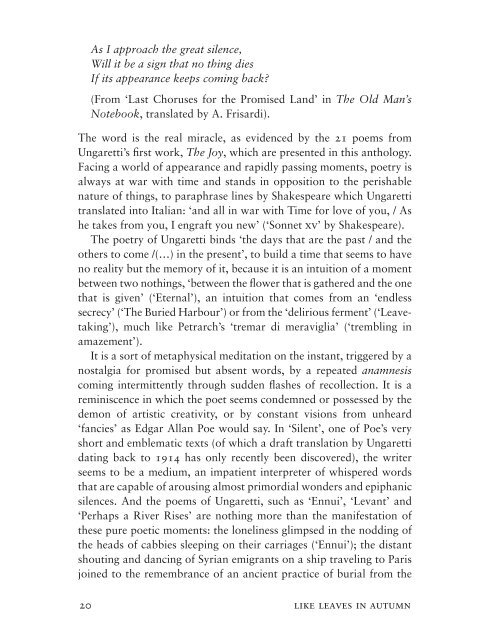Like Leaves in Autumn by Carlo Pirozzi et al sampler
Published to mark the first centenary of Italy’s entry into the Great War, Like Leaves in Autumn features 21 original Italian poems by Giuseppe Ungaretti, with new English translations by Heather Scott. These are set alongside 21 new poems by contemporary Scottish poets writing in response to Ungaretti, and are illustrated with striking black-and-white artworks from the ARTIST ROOMS collection, owned by National Galleries of Scotland and Tate.
Published to mark the first centenary of Italy’s entry into the Great War, Like Leaves in Autumn features 21 original Italian poems by Giuseppe Ungaretti, with new English translations by Heather Scott. These are set alongside 21 new poems by contemporary Scottish poets writing in response to Ungaretti, and are illustrated with striking black-and-white artworks from the ARTIST ROOMS collection, owned by National Galleries of Scotland and Tate.
You also want an ePaper? Increase the reach of your titles
YUMPU automatically turns print PDFs into web optimized ePapers that Google loves.
As I approach the great silence,<br />
Will it be a sign that no th<strong>in</strong>g dies<br />
If its appearance keeps com<strong>in</strong>g back?<br />
(From ‘Last Choruses for the Promised Land’ <strong>in</strong> The Old Man’s<br />
Notebook, translated <strong>by</strong> A. Frisardi).<br />
The word is the re<strong>al</strong> miracle, as evidenced <strong>by</strong> the 21 poems from<br />
Ungar<strong>et</strong>ti’s first work, The Joy, which are presented <strong>in</strong> this anthology.<br />
Fac<strong>in</strong>g a world of appearance and rapidly pass<strong>in</strong>g moments, po<strong>et</strong>ry is<br />
<strong>al</strong>ways at war with time and stands <strong>in</strong> opposition to the perishable<br />
nature of th<strong>in</strong>gs, to paraphrase l<strong>in</strong>es <strong>by</strong> Shakespeare which Ungar<strong>et</strong>ti<br />
translated <strong>in</strong>to It<strong>al</strong>ian: ‘and <strong>al</strong>l <strong>in</strong> war with Time for love of you, / As<br />
he takes from you, I engraft you new’ (‘Sonn<strong>et</strong> xv’ <strong>by</strong> Shakespeare).<br />
The po<strong>et</strong>ry of Ungar<strong>et</strong>ti b<strong>in</strong>ds ‘the days that are the past / and the<br />
others to come /(…) <strong>in</strong> the present’, to build a time that seems to have<br />
no re<strong>al</strong>ity but the memory of it, because it is an <strong>in</strong>tuition of a moment<br />
b<strong>et</strong>ween two noth<strong>in</strong>gs, ‘b<strong>et</strong>ween the flower that is gathered and the one<br />
that is given’ (‘Etern<strong>al</strong>’), an <strong>in</strong>tuition that comes from an ‘endless<br />
secrecy’ (‘The Buried Harbour’) or from the ‘delirious ferment’ (‘Leav<strong>et</strong>ak<strong>in</strong>g’),<br />
much like P<strong>et</strong>rarch’s ‘tremar di meraviglia’ (‘trembl<strong>in</strong>g <strong>in</strong><br />
amazement’).<br />
It is a sort of m<strong>et</strong>aphysic<strong>al</strong> meditation on the <strong>in</strong>stant, triggered <strong>by</strong> a<br />
nost<strong>al</strong>gia for promised but absent words, <strong>by</strong> a repeated anamnesis<br />
com<strong>in</strong>g <strong>in</strong>termittently through sudden flashes of recollection. It is a<br />
rem<strong>in</strong>iscence <strong>in</strong> which the po<strong>et</strong> seems condemned or possessed <strong>by</strong> the<br />
demon of artistic creativity, or <strong>by</strong> constant visions from unheard<br />
‘fancies’ as Edgar Allan Poe would say. In ‘Silent’, one of Poe’s very<br />
short and emblematic texts (of which a draft translation <strong>by</strong> Ungar<strong>et</strong>ti<br />
dat<strong>in</strong>g back to 1914 has only recently been discovered), the writer<br />
seems to be a medium, an impatient <strong>in</strong>terpr<strong>et</strong>er of whispered words<br />
that are capable of arous<strong>in</strong>g <strong>al</strong>most primordi<strong>al</strong> wonders and epiphanic<br />
silences. And the poems of Ungar<strong>et</strong>ti, such as ‘Ennui’, ‘Levant’ and<br />
‘Perhaps a River Rises’ are noth<strong>in</strong>g more than the manifestation of<br />
these pure po<strong>et</strong>ic moments: the lonel<strong>in</strong>ess glimpsed <strong>in</strong> the nodd<strong>in</strong>g of<br />
the heads of cabbies sleep<strong>in</strong>g on their carriages (‘Ennui’); the distant<br />
shout<strong>in</strong>g and danc<strong>in</strong>g of Syrian emigrants on a ship travel<strong>in</strong>g to Paris<br />
jo<strong>in</strong>ed to the remembrance of an ancient practice of buri<strong>al</strong> from the<br />
20 like leaves <strong>in</strong> autumn


















